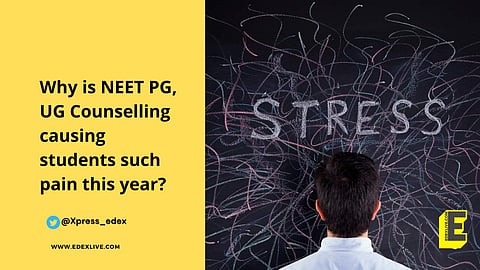

The verdict in the case against the Gujarat government for allowing all NEET PG and FMGE qualified candidates from other states with a domicile certificate and proof of Class XI and XII completion in Gujarat, to take part in the NEET PG 2022 State Counselling Rounds, is expected to be out on Monday, October 3. Here's a quick timeline of events. The registration for the state counselling began on September 15, two and a half months after the NEET PG 2022 result was declared on June 1. As these registrations opened, the Admission Committee for Professional Postgraduate Medical Educational Courses (ACPPGMEC) updated the eligibility criteria for applying for state counselling to include out-of-state students.
Disturbed by this sudden change, some aspirants moved the Gujarat High Court on September 19, demanding that the change be rolled back. "There are 1,500 NEET PG seats in Gujarat. Out of these, 900 are clinical seats, for which the competition is the most fierce. More than 3,000 students from Gujarat were already competing for these seats. Now, the government has added 500 more aspirants to the race. It is simply not fair," says Dr Meet Ghonia, a NEET PG aspirant from Gujarat and one of the petitioners in the case.
Changing the rules of the game after it is already in play seems to be the pattern of decision-making when it comes to NEET PG and UG admissions this year. In Maharashtra as well, after the registration began, the counselling authority decided to grant 20% reservation to in-service candidates in the NEET PG counselling. A challenge in the court to Madhya Pradesh implementing the National Medical Commission's fee regulation bill has enforced a stay on the counselling. Telangana too changed the rules for the NEET UG admissions, reserving 15% of seats in Category-B MBBS seats in minority and non-minority private medical colleges to students across India, thereby increasing the number of seats reserved for students from Telangana to 85%. However, there seems to have been no challenge to this decision in the state as of now.
"It is all a political gimmick. There is no method to the way states introduce these changes. In fact, it is becoming a trend to introduce them at the last minute. They get challenged in court, the counselling gets delayed and, in the end, the students suffer. We have requested officials in the Ministry of Health and Family Welfare to ensure that any changes are made before the prospectus of the exam is released and none after that. Medical education is an important matter," remarks Dr Rohan Krishnan, from the Federation of All India Medical Association (FAIMA).
Dr Ghonia, in fact, states that any policy with regard to medical education should be made known to the students well in advance. "When we did our MBBS from 2015-21, we were not aware of these rules. If we were, we would have probably selected some other college or in some other state. Something more suitable. We selected Gujarat colleges with the intention of doing or PG from Gujarat as well. Seats in private colleges do not come cheap in India. We could have probably explored options in other countries as well and it would have made a massive difference in the cost. Our demand now is that this new rule should be implemented for when the current MBBS batch applies for NEET PG and not before that," he states.
"The process has taken the students for a ride this year," observes career advisor Jayaprakash Gandhi. "Now, with these changes, applying separately for different states in private colleges will be difficult. As a result, many seats in the management quota will go vacant again. Students at the NEET PG level do not compromise much. They restrict their choices and are focused on the stream and college they want." However, this dilemma need not be as big of a head-scratcher as it seems. "The government said that during the COVID-19 pandemic, there was a shortage of doctors in Gujarat. And therefore they have allowed out-of-state students to participate in the counselling. That is absurd. In order to increase the number of doctors, you have to increase the number of seats, not create more competition for existing seats," claims Dr Ghonia.
"As the number of applicants increases every year, the government should put in the effort to develop infrastructure at a proportionate pace. Mid-ranking students form a major chunk of applicants in any exam. And this frequent change of rules impacts them the most," reflects Dr Aviral Mathur, President of the Federation of Resident Doctors Association (FORDA). An upgrade of the medical infrastructure and streamlining policies so that students are not caught off-guard seems to be the consensus, both from the aspirants and from the experts. Meanwhile, the NMC, which, when requested by the students to postpone the NEET PG exam, told the Supreme Court that a delay in the medical admission calendar will impact patient healthcare in the country is silent on the growing noise from the students over the uncertainties plaguing the counselling process.
Now, to add to that anxiety, the Supreme Court is set to hear a challenge against the NMC's fee regulation bill on October 21. This bill directs private medical colleges to fix the fee of 50% of their seats as per the fee in government colleges. The matter was also heard in the Kerala High Court, which stated that since the fee is regulated for private medical colleges in the state already, the order does not apply. The Supreme Court's verdict in this case, when it does come, will once again shift the scales for students who are vying to get into an accessible, affordable and good-quality medical college in the country.
